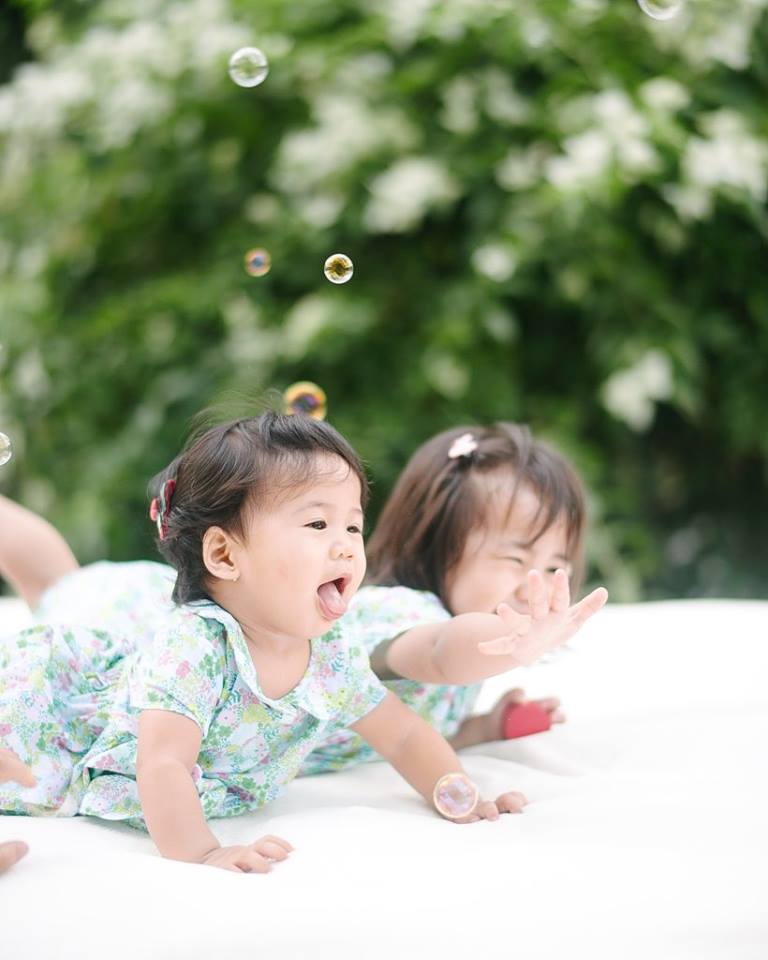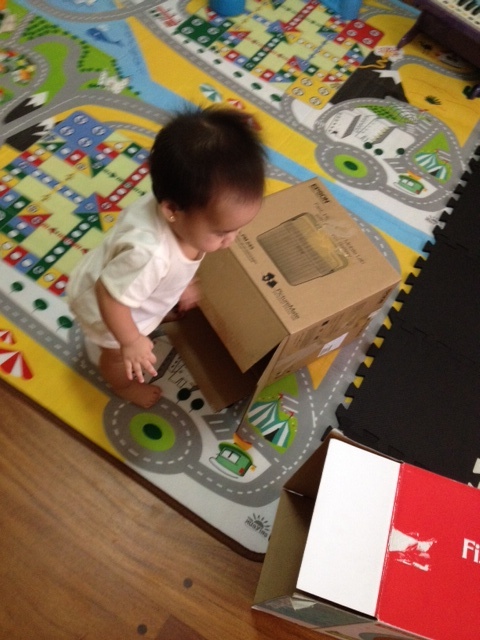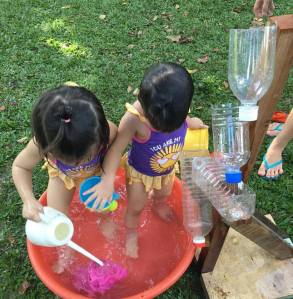Let’s continue with the series: What do babies need? This time, I’d like to talk about one of my favorite topics.
What else do babies need?
They need to PLAY!

Photo by: Nicolai Melicor-Villaurel of Oh Hello Studios
Play can be defined as an activity that your child loves doing. It is simple, spontaneous, flexible and led by the child (Centre of Excellence for Early Childhood Development, 2010, p.2). Ruth Anne Hammond in her book, Respecting Babies, shared that RIE (Resources for Infant Educarers) believes that “play is what babies do when they are not involved in any caregiving activity (diapering, feeding) and sleeping. Simply put, this is what a child does best and it comes naturally to him.
Play comes in various forms for a child: it can be done alone, with other children, with an object or with adults.
How does your child look like when he is playing?
What does he like to play with? Whom does he play with?

Why do they need to PLAY? Here are 5 reasons why babies need to play.
-
1. Babies develop physically when they play.
I love this saying from Diane Ackerman, “Play is our brain’s favourite way of learning”. Studies show the positive effects that play has on your infant’s development.
Physically, an infant’s movements and play are often one and the same. Ruth Anne explains that babies need “a chance to recognise one’s own body parts, where adults offer the baby opportunity to find himself”. This means that until babies have really learned how to use their hands (this is what you call hand regard), then toys will not be of much use, at all. When babies discover their own hands, this becomes a signal for play and later on, hand-eye coordination. Touching, grasping, holding are also other forerunners of play.

It is best to provide opportunities for self-initiated movement by placing toys/objects within his reach. By doing this, you are respecting an infant’s readiness to play.

When a child is allowed to move according to his own pacing, it will enhance the quality of his movements. When given the necessary space to move around through play, then the child learns to initiate movements on his own rather than depend on an equipment or an adult to place him in certain positions. This is why it is not encouraged that babies are propped up to sitting when they are not yet ready or placed in equipments (bouncers, etc.) that could restrict his natural movement.
2. Babies develop emotionally when they play.
Babies achieve their best emotional state when they are given uninterrupted time for play. This means that we don’t just interfere when they are playing with a toy, talking to himself, or even, when they are observing around them. Having an uninterrupted time for play enables them to express themselves-their curiosity, their need for social experiences. It simply accomplishes their need for an activity.
Ginsburg (2007) stressed that “undirected play allows children to learn how to work in groups, to share, to negotiate, to resolve conflicts, and to learn self-advocacy skills” (p.183).

Play also allows the infant to develop that motivation to seek forms of stimulation that he can have control over. This means that we, as parents should not be worried that our babies will be bored if we don’t constantly move them, bounce them around or stimulate them all the time. This is because infants need to be able to learn how to self-soothe himself, how to initiate his own movement, how to regulate himself. And playing actually helps him to achieve this.
3. It is good for their brain development.
Babies thrive on both exploration and interaction. Their ability to move about, to touch things around them, to babble/coo at a familiar person, opens up a new world for them. When they explore, they truly become absorbed as they play.
According to Sutton-Smith (1997), an infant’s early experiences are important in the development of neural pathways/connections for the brain development. Play functions as a way to help reach the brain’s potential, otherwise, lack of any stimulus will lead to some loss of these essential neural connections.
You might wonder what your child is learning when he keeps on touching a ball, and then later, throws it, and then touches it again. It looks purposeless, but something great is happening here. Through practice and repetition, it paves the way in building your child’s brain and promotes fast responses in his central nervous system.

4. Babies develop their language skills when they play.
When babies babble, coo and make facial expressions back at you, this kind of playful interaction signals the start of their language development. According to Gardner-Neblett & Gallagher (2013) in their article, More than Baby talk, explained that the way we communicate with our children and our interactions with them will greatly influence how they develop and learn. They stressed that based on studies done by Snow, CE et al (1994) and Walker, D, et.al (1994) children who develop strong language and communication skills are more likely to arrive at school ready to learn, and they are less likely to have reading difficulties and are more likely to have higher levels of achievement at school.

When we let our babies express themselves, this is enabling them to play with words. We encourage them further by responding to them and by giving our full attention during this interaction. We don’t simply talk at them, but we focus more on listening to them and being sensitive to the different cues that they are sending us. Ruth Anne (2009) explains this as not talking at children but listening as much and not interrupting their concentration on a task just to teach them words. The RIE principle suggests applying this respectful communication during caregiving tasks; we communicate with the baby as we change their diaper, feed them, or bathe them.

5. It is an important foundation for formal education.
Research shows that there is a connection between play and the development of foundational skills such as in a child’s memory, self-regulation, oral language abilities, social skills and later success in school.
Play becomes the groundwork for the necessary skills that our child need when they enter school later on. As children play, they are involved with various experimentation that expose them to numerous concepts (science, math) and problem solving strategies which then “forms the basis for… higher-order thinking in all subjects” (Wyver & Spence, 1999, p.5). Because these are all learned through meaningful experiences, children are more likely to retain these information.
Your infant when playing may look something like the following photos below:


So, before assuming that your baby is not learning anything when he does things over and over again, keep in mind that something great and good is happening. Remember, they learn best when they play. Magda Gerber’s words sum it all up when she said,
“Be careful what you try to teach; you may be interfering with what the baby is learning.”.
By having that faith in our baby’s ability to learn while he plays, it gives a certain relief knowing that our baby is learning naturally, without us having to be in charge every minute of their lives. We can at least relax, and really enjoy our time with them.
References:
Gardner-Neblett, N., & Gallagher, K.C. (2013). More than Baby Talk: 10 ways to promote the language and communication skills of infants and toddlers. Chapel Hill: The University of North Carolina, FPG Child Development Institute.
Ginsburg, K.R. (2007). The Importance of Play in Promoting Healthy Child Development and Maintaing Strong- Parent Child Bonds. American Academy of Pediatrics, 119, 182-191.
Hammond, R.A. (2009). Respecting Babies: A New Look at Magda Gerber’s RIE Approach. Washington, DC. ZERO TO THREE.


Comments are closed here.